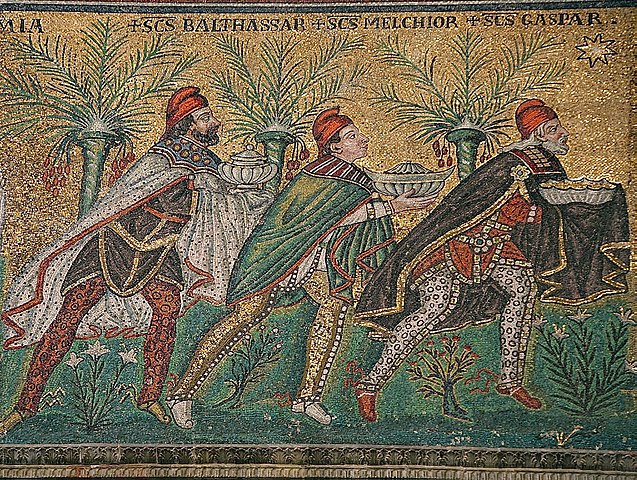
After her fourth collection Venus Invisible and Other Poems in 1928, Nathalia Crane published in 1929 the novel An Alien from Heaven, then in 1930 a long epic poem titled Pocahontas. Aferwards, nothing more from her appeared, until her fifth collection Swear by the Night and Other Poems published in 1936. In the Foreword, Louis Untermeyer gave the reason for this long silence:
Several years later I learned that interested persons, to whom Nathalia mysteriously referred as “unknown powers,” had offered to send her through college and to Europe on one condition: that she publish nothing until after graduation. These anonymous sponsors—and in Nathalia’s letters they seemed to be a cross between Olympian deities and eighteenth-century patrons in the nobility—kept their promise and Nathalia kept hers. She has been out of Barnard about a year; she has had a twenty-second birthday; and this is her new book.
Most people know the Three Wise Men Melchior, Caspar and Balthazar, the so-called Magi who, according to the Gospel of Matthew, visited Jesus after his birth, bearing gifts of gold, frankincense and myrrh. In the following poem, Nathalia Crane praises another type of Wise Men, who love small children, showing “an interest in birthdays” and giving them “kisses on the cheek” rather than incense.
THE WISE MEN
by Nathalia Crane
The Wise Men still are with us and as wonderful to-day
As on that ancient morning by a cradle lined with hay.
They hand us not the incense or the precious oils of eld,
But an interest in birthdays that the years have not dispelled.
A carol for a Christmas morn; the honor due a tree;
A chant for Blessed Damosel and road to Bethany.
But when the Yuletide merriment has gone beyond the feast—
We make our preparations for the Wise Men of the East.
The romance in an antic, and the dancer worth her tune
Have always pleased the Wise Men on a Christmas afternoon.
They are the modern Magi who can make an image speak,
And manufacture Orients with kisses on the cheek.
For them an Esmeralda goes a-whirling in a gown;
The Wise Men laugh when two-year nymphs arise and then sit down.
They stare at dazzled infants picking shadows from the wall;
They raise binoculars and shout when toddlers tip and fall.
When’er an unpinned cupid mounts the damask for a bun,
They see ten knights in harness where our armorer sees one.
The Wise Men still are with us and as wonderful to-day
As on that ancient morning by a cradle lined with hay.
They hand us not the incense or the precious oils of eld,
But love for all the children that the years have not dispelled.
Source of the poem: Nathalia Crane, Swear by the Night and Other Poems, Random House, New York (1936), digitisation on Internet Archive.

